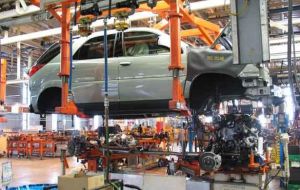MercoPress. South Atlantic News Agency
Argentina's industrial production down 6.7% year on year in April
 It was the first industrial output data released since Macri took office. Macri shut down the publishing of economic data while revamping the country's stats agency
It was the first industrial output data released since Macri took office. Macri shut down the publishing of economic data while revamping the country's stats agency  Macri has cut thousands of government jobs, lowered energy subsidies and allowed the currency to float, prompting the peso to weaken by 30%
Macri has cut thousands of government jobs, lowered energy subsidies and allowed the currency to float, prompting the peso to weaken by 30% Argentina's industrial output contracted 6.7% in April compared with the same month last year, the country's newly revamped Indec statistics agency said, punctuating the effect of recent fiscal austerity measures.
It was the first industrial output data released since President Mauricio Macri took office in December. Macri shut down the publishing of economic data while revamping the country's statistics agency, which had long been accused of publishing inaccurate numbers under the previous government.
The center-right leader won office promising to stoke investment by tackling the wide fiscal deficits left by his predecessor Cristina Fernandez, a free-spending populist who harnessed the economy with heavy currency and trade controls during her eight years in power.
Macri has cut thousands of government jobs, lowered energy subsidies and allowed the currency to float, prompting the peso to weaken by 30%, which in turn increases inflation. He also ditched agricultural export taxes and other controls, winning plaudits from investors and farmers while incurring the wrath of labor unions.
Industrial output rose 1.5% in January versus a year earlier, Indec said in a statement. Production rose 0.2% in February and fell 3.8% in March. In the first four months of the year, Indec said industrial production fell 2.4%. Likewise construction activity plunged 24.1% year on year in April.




Top Comments
Disclaimer & comment rules-

-

-

Read all commentsDecreased domestic demand and the opening of imports are beginning to show the consequences of the economic measures taken by the current Argentine government.
Jun 02nd, 2016 - 12:59 pm 0As many as 1,700 small and medium-size construction, manufacturing, tourism and retail companies, many of those hurt by imports and by reduced demand.
With a weaker domestic economy, the bets of the government are on its promised “rain of investments,” which is not happening.
No a healthy way of consolidating any economy, and a sure path to over indebtedness.
@1. Tough. With all that your country has visited on the world, it's time your country learned to suffer. 255 British servicemen killed. Falkland Islanders subjected to argie war crimes. Failure to pay debts. Let your country learn to do without. It's what you tried to force on the Falkland Islands. Fortunately, almost anyone British is better than you. I wonder if you think that I would care if argieland was subject to countrywide famine, malnutrition, starvation. I wouldn't. Argieland needs to spend the next 30+ years in abject poverty.
Jun 02nd, 2016 - 03:38 pm 0“ He [Macri] also ditched agricultural export taxes...”
Jun 02nd, 2016 - 07:01 pm 0Deliberately misleading reporting by Mercopiss once again.
----------------
There are many reasons for the “ downturn” in industrial production, and not all of it can be explained by generally lower demand in the region. Part of the problem with Argentine “ industry” is that it's mostly technologically backward, and tends to be a place where things designed and manufactured elsewhere are merely assembled. But Argentina's assembly industry operates with very high costs and quite low efficiencies so it is generally noncompetitive (average loaded cost for argie assembly worker is over US$20/hour, in part due to high benefit compensation). And because of regional trade agreements, the other countries in the region are paying the price for lower-quality, higher-priced items that are noncompetitive in other market areas, rather than having the potential benefits of freer trade with manufacturers outside of South America.
The general decline in Argentina right now is also seen in the construction industry. There are about 50,000 fewer construction workers employed here now, versus a year ago.
So long as Argentistan is run by argentos in the same old argento manner, it will continue to be a failed and increasingly failed state.
Commenting for this story is now closed.
If you have a Facebook account, become a fan and comment on our Facebook Page!